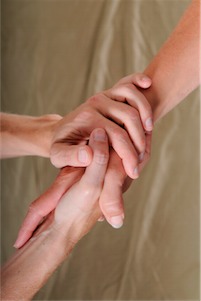Ending A Long Term Relationship
How To Deal With Grief When You Are Emotionally Stuck In The Past
By Jon Terrell, M.A.

When ending a long term relationship, we naturally feel grief at the loss of it. Grief takes time to heal, and there are things we can do to move through our grief more quickly and effectively.
After ending a long-term relationship, we can get emotionally stuck in the past with all sorts of whys, what-ifs, self-judgments, if-onlys, etc. Sometimes, it's unclear if ending was the right thing to do, and we can tie ourselves in a knot trying to figure out what to do and say.
Our Grief and Loss Retreats are designed to help people heal from their emotional pain and gain the ability to move forward in their lives. The retreats help us deal with all sorts of feelings around our grief--resentment, jealousy, fear, anger, bitterness, regret, etc. Participants learn how to deal with grief.
People often come to our retreats because of painful endings, including the death of a close family member. The end of a long term relationship is a type of death. It has many similarities to a human death. There are differences as well.
Advice About Ending A Long Term Relationship

Give Yourself Time To Mourn
Many of us grew up in families that stepped over grief and that didn’t deal very well with loss and sadness.
For example, in my family, we didn’t talk about sad feelings even though we had more than our share of separations and deaths. It was an unspoken taboo buried under our day-to-day experiences. I grew up not knowing how to deal with grief, my own or others.
So when I started dating, I attracted women who had their share of hidden emotional pain, which I also tried to ignore. These buried feelings ended up tarnishing everything, destroying relationship after relationship.
Finally, with the help of a therapist and grief and loss retreats, I learned to slow down and make time for my grief and my tears. What a relief!
I got help! I was emotionally stuck in the past, the long past, of major and minor losses that I had ignored or stepped over. At deep emotionally healing retreats I consciously mourned and felt the pain of past losses. I've learned how to carry that grief rather than ignore it and risk moving into depression.
And I’ve learned how healing tears can be.
Now, at our grief, loss and difficult emotions retreats, I help others who are in emotional pain and emotionally stuck in the past.
When ending a long term relationship, it is essential to take the time to grieve the loss rather than quickly move on. Otherwise, we'll carry our pain forward and taint our future. We may get into a new relationship to avoid the pain of grief, but without healing the past we eventually bring the old feelings into the new relationship.
Prolonged grief, which is often buried below our ordinary awareness, can weigh us down, diminishing our joy in life.
I've also learned to pay attention to other feelings that can arise to protect us from grief. Do you quickly go to anger at your ex to cover up your grief? To blame them or perhaps to accuse others of causing the breakup? These are often learned behaviors (from childhood) designed to keep us from facing our grief.
How Long Is Too Long To Grieve?
Grief has its own timetable, so there is no set amount of time for how to deal with grief. You grieve as long as you need to, and one day, if you have genuinely grieved and not avoided the grieving process, you know you are done. Instead of feeling emotionally stuck in the past, you are done and ready to move forward.
If you are grieving ending a long term relationship, it will probably take longer than a few weeks. It may be too long if you are deeply grieving longer than several months. Then it may be time to get help...from a grief counselor or, especially if you want quick relief, by going to one of our grief retreats.
Deal With The "Push-Pull"
Towards the end of a relationship, we can get pulled in all sorts of directions. Should I stay and try to work it out? Or should I go?
This kind of push-pull can go on well after the breakup, we may think as examples:
- Will she/he wake up and realize I am the one and come back?
- But I still love him/her.
- I’ve got to get on with my life and block him/her out.
- They're the only one who ever really loved me.
We can waste a massive amount of our life energy on regret, fantasy, hope, dreams, etc., that aren’t really reality-based. We can stay in this relationship limbo way too long, just as we might stay in a relationship that isn't working too long.
So, how do you deal with all the push-pull?
For many of us the pull of our emotions can overwhelm any rational, objective thought or any advice we get from family or friends. We may hold on to what is not working for way too long.
One way to deal with the push-pull is to identify your relationship needs and make an objective evaluation if this person can fulfill them. My friend Lawrence often points out that we often choose poor strategies to meet our goals.
And your love interest may be part of a terrible strategy to get your needs met!
It is making this distinction between strategies and goals/needs, that can help us move beyond the push-pull yo-yo and decide what to do.
In other words, we need to ask ourselves, "Is being with this person a valid path to meet my relationship needs?" "Is ending this long-term relationship a way for me to meet my needs and goals?"
NVC (Non-Violent Communication) is an excellent resource for identifying our needs and wants. Many of us choose partners that are poor strategies for meeting our relationship needs!
Changing The Old Story

The best relationship breakup advice I have is to heal your core relationship patterns. These patterns keep you emotionally stuck in the past.
The quickest way to improve your EQ, your emotional intelligence, is to heal from past relationship wounds.
To break those patterns we need to change the underlying relationship old story that we've learned growing up, often starting with our father and mother. Unless we were an orphan or our parents divorced when we were very young, our relationships with our parents are our first long-term relationships!
When we heal this primary relationship, we can live into a new healthy relationship story. We are free to choose a person who will meet our needs.
At our retreats. participants often start their work with a current relationship and then discover that what they really need to deal with is healing their childhood pain that is underneath and reinforcing their pain in ending the current relationship.
Self-Care After Ending A Long Term Relationship

Emotional processing is hard work. You may have difficulty sleeping and focusing on day-to-day activities. You may neglect self-care.
And yet this is when you need to take care of yourself, get sufficient rest, eat healthy, and do activities that support your body and mind.
What are some physical activities that can support you?
- Being out in nature
- Yoga, Tai Chi, Qigong
- Aerobic exercise
- Any activity in water... swimming, showers, baths. etc., to help release the internal emotional waters
- Massage or bodywork
Emotional and mental support is also an essential and valuable part of self-care.
- Creative expression—Journaling can be helpful if it is about expressing old feelings to let go of them. But just ruminating about the relationship, going around and around in your mind, is not beneficial.
- Spiritual practices such as prayer and meditation can be especially useful in opening up new space for healing.
- Connecting with friends can be helpful, especially if you tend to isolate. Being with friends can be very helpful, especially if you don't keep rehashing the relationship issues.
- Seeing a therapist can be a helpful way of working through your issues and getting clarity, mainly if it focuses primarily on helping you own your issues and do your work rather than focusing on what was wrong with your ex.
- Going to a retreat that focuses on emotional healing.
Avoid entering another relationship too soon!
While rebounding into another relationship may be a strategy to avoid the pain of ending a long-term relationship, it is a poor strategy for healing.
You won’t do the grieving work that you need to do, and it will tarnish the new relationship. Y.ou will very likely end up repeating old patterns in the new one. And you may not be fully present in the new relationship because you are emotionally stuck in the past.
That is why deep emotional healing is so helpful in breaking free of the old story and creating a new healthier one. My colleague Genie Joseph, PhD, recommends at least a 90-day relationship-free zone between partners.
You may also be interested in reading Ending A Long Term Relationship-Top Ten Etiquette Tips, written by Genie Joseph, PhD.
Jon Terrell, M.A., leads emotional healing retreats in western Massachusetts, Florida, and sometimes California. He offers counseling about ending a long-term relationship and relationship breakup advice, as well as other sensitive issues via Skype and phone.
His signature retreat, which is offered several times a year, is Grief, Loss, and Difficult Emotions Retreats. You can reach him using the form below.
Go From Ending A Long Term Relationship To Grief Retreat Page
Go To Breaking Free Of The Old Story Retreat Page offered each summer
Go To Working Through Prolonged Grief
Go To 10 Things I've Learned About Grief
